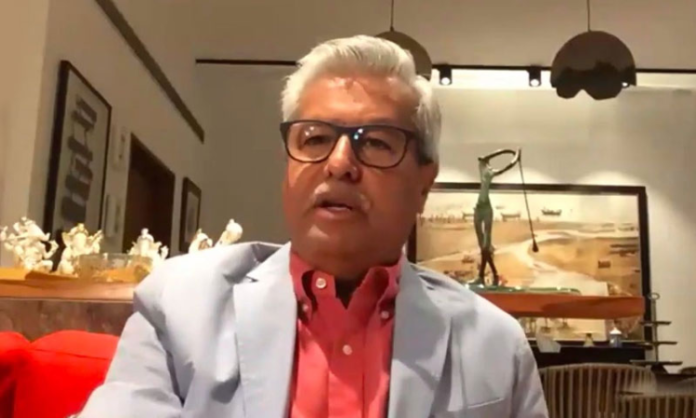– Mohd Naushad Khan
In an interview with MOHD NAUSHAD KHAN, senior advocate DUSHYANT DAVE, former President of the Supreme Court Bar Association (SCBA) and one of India’s most respected legal minds, opened up about his recent decision to step away from active legal practice after a distinguished career spanning nearly five decades. His retirement, though not a complete exit from public life, comes at a time when the Indian judiciary faces increasing scrutiny, both in its functioning and its role in upholding constitutional values.
Dave began by reflecting on his 48-year journey in law, a career shaped by early struggles, professional growth, and relentless commitment to justice. From representing the Gujarat government in the 1980s to handling corporate, constitutional, and public interest cases, his legal practice has been both diverse and socially rooted.
“I must have done 600-700 cases pro bono,” he recalled, helping victims of communal riots, political dissenters, farmers during the farm law protests, and underprivileged litigants. For Dave, the real satisfaction came not from high-profile cases but from serving the powerless. “The love and affection I received from people is my biggest reward,” he said.
As President of the SCBA, Dave spearheaded critical reforms and infrastructure improvements. Notably, he helped create the first-ever bar room in the Supreme Court and a dedicated litigants’ lounge – spaces that underscore his belief that courts exist for people.
“We must respect litigants. From farmers to IAS officers, everyone comes to the Supreme Court. They deserve dignity,” he said.
Though he has stepped away from legal practice, Dave insists he is not retiring from public life. “I want to pursue passions – reading, music, golf, my grandchildren – and do social work in Vadodara,” he said. “But I will continue writing, engaging in public discourse, and maybe even write a book.”
His decision, he says, was driven by the desire to free himself from the mental toll of law practice and to contribute to society in different ways. “I felt I must now devote time to myself and the country in another capacity.”
With characteristic frankness, Dave shared his deep concerns about the current state of the judiciary. Though he respects the institution and believes in its vital constitutional role, he laments its declining courage in recent decades.
“In the first three decades after Independence, the Supreme Court took its constitutional obligations seriously,” he said. “But in the last 40 years, there has been a shift. It has started avoiding difficult constitutional questions and fundamental rights issues.”
Dave argued that this abdication has diluted the Court’s moral authority and allowed executive overreach. While praising landmark rulings like Vishaka v. State of Rajasthan, he believes the court has largely failed to protect the rights of marginalised groups and to enforce constitutional morality.
According to Dave, the judiciary cannot serve justice if it lacks empathy. “Judges must have compassion in their hearts. Otherwise, they can’t be good judges,” he asserted.
He highlighted the underrepresentation of women, Dalits, and minorities in the higher judiciary as a major failure. “We have just one woman judge in the Supreme Court. We need more Dalits and minorities, especially at a time when their constitutional rights are under threat.”
Dave warned that constitutional safeguards such as Article 14 on equality are being diluted. Hate crimes, bulldozer justice, and lynchings, he said, require strong judicial intervention.
“Governments may have political compulsions. But judiciary must rise above them and uphold the Constitution fearlessly.”
One of Dave’s most pointed criticisms was directed at the collegium system – the process by which judges appoint judges. Though initially created to ensure judicial independence, Dave believes it has failed.
“Many appointments have been poor. We have seen incompetent and even corrupt judges enter the system,” he said. “Even a single rotten judge can damage public trust.”
Dave acknowledged that finding a perfect alternative is difficult, but insists that transparency, merit, and national interest must be prioritised. “Before 1992, the executive made better appointments. Collegium lacks accountability, and its secrecy fosters mediocrity.”
On judicial corruption, Dave was unequivocal: “It must be rooted out with strong hands.” Referring to the Justice Verma case, he said that if prima facie evidence of bribery exists, the Chief Justice must not hesitate to let the law take its course.
“Judges cannot be treated as untouchable gods. If a peon can be arrested for a ₹200 bribe, why not a judge with serious allegations?” he asked. He argued that shielding corrupt judges under the guise of judicial independence actually weakens the institution from within.
He also rejected the notion that impeachment is the only way to remove judges. “The Constitution never anticipated such widespread misconduct. A better, faster mechanism is urgently needed.”
Dave believes meaningful judicial reform must come from within – through collaboration between bar and bench. “The bar has become weaker. Quality of lawyers is suffering. Judges are overwhelmed with caseloads. These challenges cannot be solved in isolation.”
He expressed hope that the new generation of lawyers, academically equipped and idealistic, will help revive the institution’s credibility. “We must restore standards. India cannot afford to become a nation that rewards mediocrity.”
As India debates the future of its judiciary, Dave’s voice resonates as a reminder of what is at stake. Constitutional rights, the rule of law, and the very soul of democracy hang in the balance.
He remains cautiously optimistic. “We need judges with vision, empathy, and integrity. We need lawyers with courage and public spirit. Only then can we rebuild trust.”
Even in retirement, Dave refuses to be silent. His life’s work, now entering a new phase, remains anchored in a fierce commitment to justice, democracy, and the Constitution.
As he put it, “I may have stepped away from the courtroom. But I haven’t stepped away from the people’s cause.”




